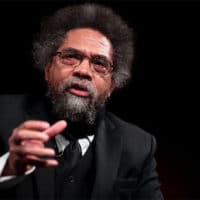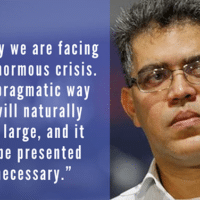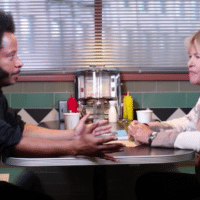-
How not to measure inequality
When we look at inequality from the perspective of the poor – using the theory of increasing egregiousness – it becomes clear that the relative metric is inappropriate as a tool for assessing distribution. Certainly if our objective is to end poverty, this is the conclusion we must draw, as an additional dollar going needlessly to the rich could have been used to reduce poverty, and yet was not.
-
Speaking the truth
Cornel West and Deborah Chasman discuss the disproportionately white publishing world, the responsibilities and burdens of public life, and the predicament of black intellectuals today.
-
Defending Chavez’s project today
I began to work directly with Comandante Hugo Chavez in May 1996. By that time, Chavez was already exploring the idea of participating in elections.
-
The plot to kill Venezuela
Vijay Prashad looks at the purpose and impact of sanctions against Venezuela.
-
Ellen & Rachel Meeropol and Boots Riley on art and resistance
Ellen Meeropol is the author of two novels about law, justice, and government surveillance. Her most recent book, “On Hurricane Island,” explores a fictional secret domestic detention camp for citizens.
-
The great work
This isn’t really capitalism as we used to know it. My father and mother had a restaurant. That’s capitalism. What’s taken over now is big corporate capitalism.
-
Colored Property & State Debt with David Freund
In this episode, we talk with David Freund, associate professor of history at the University of Maryland. David is the author of Colored Property: State Policy and White Racial Politics in Suburban America, an award-winning book that tracks how the language of racial exclusion was re-coded in terms of markets, property, and citizenship in the post-World War II era.
-
The propaganda multiplier: how global news agencies and western media report on geopolitics
In this case study, the geopolitical coverage in nine leading European newspapers was examined for diversity and journalistic performance using the example of the Syrian war.
-
Why so hostile? Busting myths about heterodox economics
Does accepting the term heterodox economics mean we accept our marginal disciplinary status? No. On the contrary, we use the term in order to challenge this marginalization. If people find the heterodox label confusing, we should be able to clarify where we are coming from.
-
Warnings of ‘Gulf of Tonkin 2.0’ as Trump officials blame Iran for oil tanker attacks
It’s obvious that Bolton and Pompeo are trying to create a Gulf of Tonkin incident with Iran.
-
Making excuses for unemployment: The myth of a “skills gap”
The current labor force participation rate of prime age workers, those 25-54 years, is a case in point. It remains below the previous peak rate in 2008, and even further below the peak rate at the turn of the century. We would need an additional 1.2 million employed prime age workers to match the 2008 labor force participation rate and 2.5 million more to match the turn of the century rate. Still it appears that at the present moment unemployment is no longer a major political issue.
-
Cuban “troops” saving lives in Venezuela
Cubans are truly committed to the principle of sovereignty, we are protective of our independence, and we would never do to others what we would not allow to be done to ourselves.
-
Guaido Requests U.S. military ‘cooperation’ to oust Maduro as U.S. vessel violates Venezuelan waters
A meeting between Guaido’s team and the U.S. Southern Command is being organised.
-
Pasqualina Curcio: ‘Hyperinflation is a Powerful Imperialist Weapon’
“Unilateral coercive measures…[directed by the U.S. against Venezuela] affect the entire population in a deliberate and systematic manner. That is why, in accordance with the Rome Statutes [of the International Criminal Court], they are crimes against humanity.”
-
Venezuela’s crisis: a view from the Communes
Federico Fuentes explores grassroots communal organisation, and the tension between popular power and sectors of the government.
-
Could this be the most Marxist film ever made?
Can a film be true? More to the point, can a film about capitalism avoid being recuperated by the system as just another commodity to make money for the culture-industry? Predictably, Riley sides with Marx, who said: “The question whether objective truth can be attributed to human thinking is not a question of theory but is a practical question…. Philosophers have hitherto only interpreted the world in various ways; the point is to change it.”
-
Trump continues Obama’s war on whistleblowers, arrests another alleged Intercept source
This outrageous explosion of watchlisting — of monitoring people and racking and stacking them on lists, assigning them numbers, assigning them ‘baseball cards,’ assigning them death sentences without notice, on a worldwide battlefield — it was, from the very first instance, wrong.
-
Note from USA: The A to Z of the American Police State
What characterizes American government today is not so much dysfunctional politics as it is ruthlessly contrived governance carried out behind the entertaining, distracting and disingenuous curtain of political theatre. And what political theatre it is, diabolically Shakespearean at times, full of sound and fury, yet in the end, signifying nothing.
-
A first-hand account from Caracas from the day of the coup through May Day
Today there was a farcical attempt to take a military airport that fizzled. It turned into a dozen or so guys throwing stones and being ignored. The Guardian is shamelessly running video of something that happened weeks ago as though it were today. We were there and it was all normal.
-
The Atlantic illustrates everything that’s wrong with media coverage of Venezuela sanctions
“Trump’s Venezuela Policy: Slow Suffocation,” an Atlantic report (4/17/19) by Uri Friedman and Kathy Gilsinan, passed up a rich opportunity to expose the humanitarian pretexts for economic intervention, and instead exhibited the worst tendencies of corporate media coverage of U.S. policy in Latin Ame




















